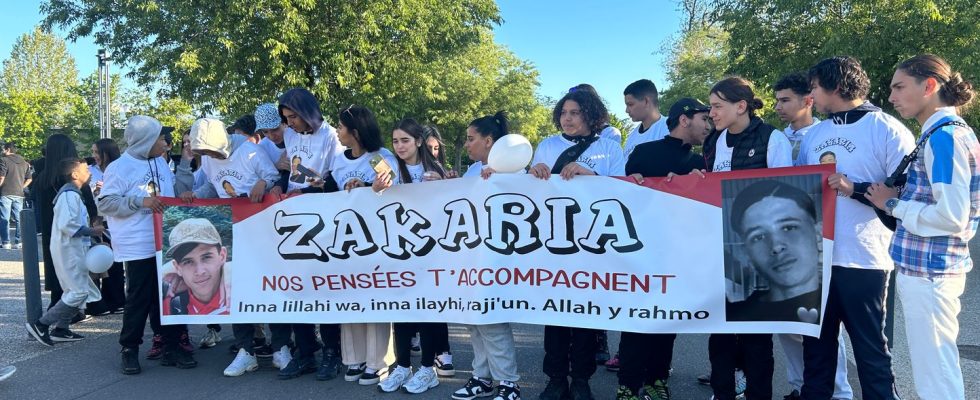“He was our everyday friend, it was normal, it was obvious that we would be here today,” says Achour, 15, still moved. He was one of the best friends of Zakaria, 15, who was stabbed in the back on April 9 during a “punitive expedition” orchestrated by a father in this neighborhood of Romans-sur- Isère.
This Friday evening, at 6:30 p.m., hundreds of people, many families and people from this neighborhood wanted to pay tribute to this “child”, unanimously described as “discreet”, “kind”, and “without problem”. The white march which took place within La Monnaie, where he grew up, ended where he was stabbed around ten days ago between speeches and a minute of silence.
“Zakaria, we are all here, in Chopin, where your life ended,” says Philippe Galant, neighborhood mediator for thirty years. Your face and your smile, no one will ever forget them. » “Little Zakaria, he was all of our little brothers,” adds Driss, his training master, before collapsing. “He was a young man trying to get by and he was doing very well. He was a hard worker. Now, unfortunately, there is nothing we can do except pray for him,” he continued with difficulty, sobbing.
“How could I still laugh? »
Dressed in a white t-shirt with the teenager’s head printed, a young woman who saw him grow up “still doesn’t realize”. “He wanted to intervene because he saw that there was a problem. Even in this gesture, we see all the goodness of the person he was,” she says.
His “lifelong friends” also have difficulty believing what happened. In the front row to hold the banner in his tribute, they wanted to be present for his loved ones and show “all the solidarity of this neighborhood”. “He was our brother,” says Mohamed-Tahar, 15 years old. I had known him since I was 3, we spent all our time together. » He describes his best friend as someone who was “always there for everyone.”
“He was always smiling and very respectful. He was helpful. When we felt bad, we could confide in him, he was always listening but also always there to make us laugh,” says Achour. “Today, we force ourselves to laugh. I tell myself that my friend is dead, how can I still laugh? », Raises Mohamed-Tahar, his throat tight.
“He died before our eyes”
“He died before our eyes,” adds this young man, looking towards the scene. “We held him in our arms when he had just been stabbed, we called the firefighters, we waited for hours to find out what was happening at the hospital,” Sofiane describes in specifying that he still has chills. “And he died in a place where we stayed every day. Every time we end up there, we will have images of this evening. Even today, I feel like it was yesterday and I think that all my life it will be like that in our heads. »
Sofiane adds: “There are no words to describe what we feel when we lose our friend, the one we consider a brother. We are 15 years old, our daily life was spending time together, going to the swimming pool, relaxing and laughing. Today, we try to stay united among ourselves. We no longer do anything without really being all together. »
“We no longer feel safe at home”
This group of teenagers, still in shock, are sad but also angry. “We also want Zakaria’s head to be at the bottom right of the BFM banner on TV [comme ça avait été le cas pour Thomas, mort à Crépol il y a cinq mois]. It’s unfair that this case doesn’t get bigger. He’s still a human who was killed, but just because he comes from a neighborhood, he doesn’t deserve as much importance? », gets angry Mohamed-Tahar.
Before clarifying: “We know the image they want to give us, but it’s false. If La Monnaie was that dangerous, the people who killed Zakaria wouldn’t even have been able to enter the neighborhood, and above all, they wouldn’t have come out like that with their knife. »
In addition to being very affected, they are also marked by this event. “Now, we are no longer calm when we leave our homes. We look at every car that passes. We no longer feel safe,” continues Mohamed-Tahar. Sofiane concludes: “We tell ourselves that each kiss we give our mother’s forehead before leaving, it could be the last…”

